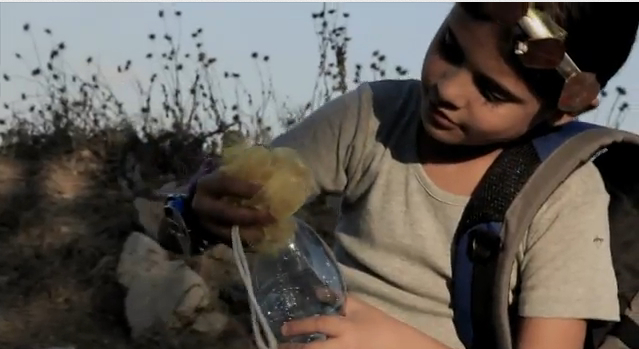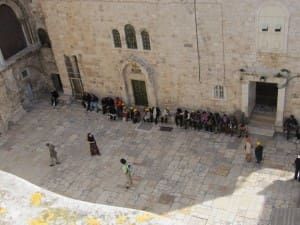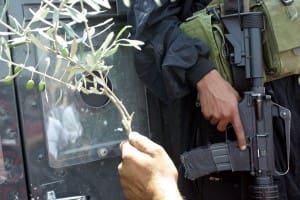I am very excited to be able to share this rare first-hand account of accessing Gaza through the tunnels that link the Gaza Strip to the outside world. To protect those involved, the author of the account is anonymous and all the names have been changed. Note: The photos are of the Gaza tunnels, but they were not taken by the author of this account, nor were they taken on the same trip.
Opening remarks
- I was invited to visit Gaza by a small organization, Tida Gaza. I accepted the invitation on the same day.
- After being informed of the documents I hold, the organizers proposed two options through which I could enter Gaza. The first option: to enter through the official crossing point at Rafah (al-Ma’bar), which meant that I would fly from Tel Aviv to Cairo, and be driven from there by car to Rafah. This required me to visit the US Embassy in Cairo a day before (since I would be traveling on my US passport) in order to give me a letter clearing them from any responsibility, while in Gaza. It required also pre-coordination with Egyptian intelligence. The second option: to enter through the underground tunnels, which required pre-coordination with the Ministry of the Interior of the Gaza government, but without any coordination with the American or Egyptian authorities.
- I opted for the second option right away based on the principle that I, as a Palestinian, should not require external coordination, especially with our enemies, to interact and deliberate with my people, wherever they are, on important issues that affect our collective future. My organizers took upon themselves to do the necessary coordination with the Gaza authorities.
- All communications with me were through emails and telephone. I received a scanned copy of an entry permit from the Ministry of Interior valid for 30 days; a lecture was arranged for me; samples of my earlier writings were requested and sent; a scanned copy of my US passport; and names and numbers of all necessary contacts in Gaza responsible for my visit. At this moment, early on, I was impressed, and worried at the same time, by the level of openness, overtness, and normalcy of the whole process. On the other hand, I kept reiterating to myself that I was not on a secret mission; I was going to lecture to university students, and to hold discussions in an open small seminar with concerned young people on pressing issues of “development”, which I addressed in my most recent book. Accordingly, I reserved my flight.
Getting in
My flight on Air Sinai from Tel Aviv to Cairo was scheduled to leave at 12:00 noon on a Monday; it was about 30 minutes late. We arrived at Cairo airport at about 2:00 pm, Egypt time. As an Israeli citizen, I exited from Tel Aviv on my Israeli passport, and I entered Egypt on my American passport. This is the only way I could travel.
After I came out of customs, I saw four taxi drivers holding names of persons for whom they were waiting. I veered towards them in search of my name, but it was not among them. My heart sank for a minute; I was calm, however, but panic was about to set in! At that moment, my designated driver, whose name and cell number I was carrying, came in with my name and identified me. Without wasting anytime, he picked up my suitcase, directed me to his car, and we started heading northeast in the direction of Rafah (on the Egyptian-Palestinian border—keep in mind that Rafah is an artificially divided city on both sides of the border).
It was a drive of about 4-5 hours (450 km). I tried to learn everything about “Mohammed” (my driver), and he about me. Often I had to repeat my question or comment because of difference in our spoken Arabic dialects, which rendered some word usages too incomprehensible to both of us. Nevertheless, I learned that he grew up in various regions of the Sinai desert because his father was the chief engineer for putting in the railroad tracks for the “Hijaz Line” in the early thirties under the British occupation. I felt reassured, particularly as it began to get dark, that he was familiar with the region in which we were driving, and that he spoke the local vernacular. Most of the road northeastward, after clearing the Egyptian city of Ismailiyya, was dusty, to a suffocating degree, with sand in the air—a desert—until we got to the city of El-Arish on the shore of the Mediterranean. From there we continued towards the city of Rafah, not to the official Crossing point between Egypt and Gaza, but to the “tunnel area”, which we reached around 5:45 pm.
Whereas the official Rafah Crossing is clearly marked with Egyptian flags, visible structures and signs, the entrance to the “tunnel area” is buried in the sand, and decipherable only to the knowledgeable; neither my driver nor I possessed this needed knowledge. Finally, we reached, as close as we could, the general tunnel area, and waited for instructions from my organizers on the Palestinian side.
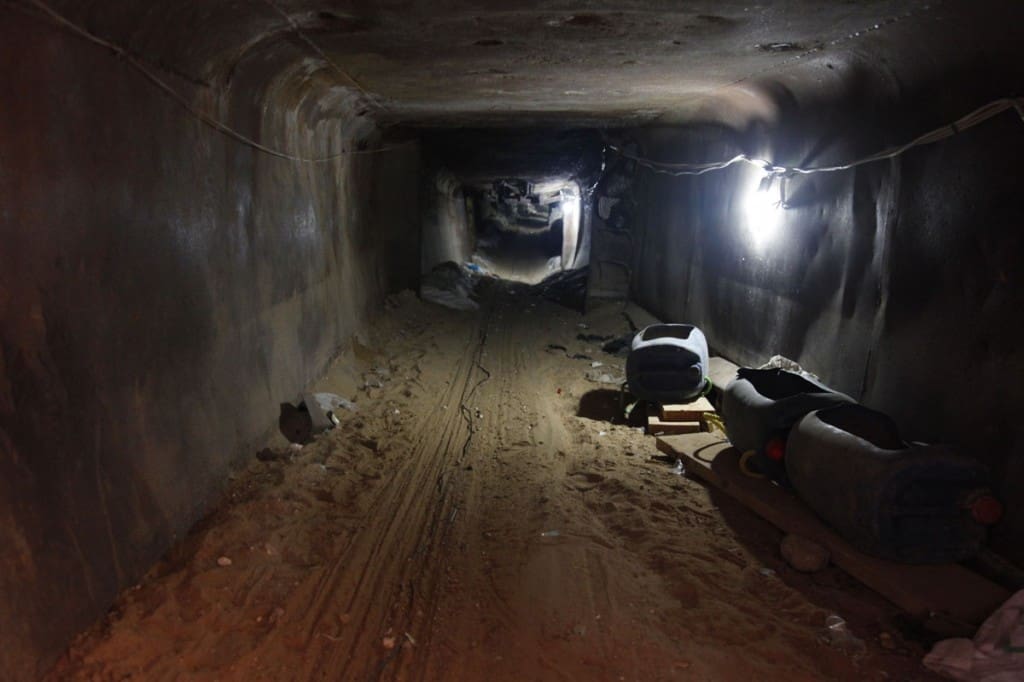 In a way, it was tantamount to arriving at the right “terminal” in the airport, so to speak, but without any “gate” information, i.e., which of the nearly 1,700 tunnels we’re “scheduled” to take so that we can meet in the right place with our people on the other side. As we approached, Mohammed suggested calling my contact on the other side. I called twice as we waited on the Egyptian side. A “committee”, we were told, was convening to decide which tunnel to “allocate” for my crossing, since I had a formal entry approval from the Palestinian Ministry of the Interior—Gaza Government. Fearing that it would become dark soon, and I won’t be able to cross, and may had to stay overnight on the Egyptian Rafah side, Mohammed decided to seek the advice of his local tribal contacts. He did, and someone by the name of “Abu Bilal” met us there soon after. After a brief discussion he proposed the “right” tunnel to take, which, I assumed, it was based on considerations of familiarity, safety and reliability? He knew it by the name of its owner/operator (a privately-owned). He directed us to the “mouth” of the tunnel. There, we encountered two men sitting on plastic chairs in the sand, without any appearance of urgency, sipping coffee or tea comfortably, around the “mouth” of the tunnel. Hovering around them were two or three young men. One of them had a Vespa-like motorcycle (referred to locally as “tuk tuk”), ready to service us. Our local guide explained the situation and my urgency to cross before it gets dark, since my people are awaiting my arrival on the other side, and that I had an official entry permit (which I pulled out on cue). One of the men made a couple of contacts on his Jawwal (presumably to their men at the other end); and then they approved my crossing into their tunnel. It was a “commercial” transaction, for which I knew I had to pay $100 each way. Immediately, we conveyed this info to our “organizers” on the Palestinian side. At last, I was very relieved to know that I was cleared to enter through “their” tunnel. No pictures were allowed; my mobile with camera was withheld at the beginning, and returned to me at the end of the ride.
In a way, it was tantamount to arriving at the right “terminal” in the airport, so to speak, but without any “gate” information, i.e., which of the nearly 1,700 tunnels we’re “scheduled” to take so that we can meet in the right place with our people on the other side. As we approached, Mohammed suggested calling my contact on the other side. I called twice as we waited on the Egyptian side. A “committee”, we were told, was convening to decide which tunnel to “allocate” for my crossing, since I had a formal entry approval from the Palestinian Ministry of the Interior—Gaza Government. Fearing that it would become dark soon, and I won’t be able to cross, and may had to stay overnight on the Egyptian Rafah side, Mohammed decided to seek the advice of his local tribal contacts. He did, and someone by the name of “Abu Bilal” met us there soon after. After a brief discussion he proposed the “right” tunnel to take, which, I assumed, it was based on considerations of familiarity, safety and reliability? He knew it by the name of its owner/operator (a privately-owned). He directed us to the “mouth” of the tunnel. There, we encountered two men sitting on plastic chairs in the sand, without any appearance of urgency, sipping coffee or tea comfortably, around the “mouth” of the tunnel. Hovering around them were two or three young men. One of them had a Vespa-like motorcycle (referred to locally as “tuk tuk”), ready to service us. Our local guide explained the situation and my urgency to cross before it gets dark, since my people are awaiting my arrival on the other side, and that I had an official entry permit (which I pulled out on cue). One of the men made a couple of contacts on his Jawwal (presumably to their men at the other end); and then they approved my crossing into their tunnel. It was a “commercial” transaction, for which I knew I had to pay $100 each way. Immediately, we conveyed this info to our “organizers” on the Palestinian side. At last, I was very relieved to know that I was cleared to enter through “their” tunnel. No pictures were allowed; my mobile with camera was withheld at the beginning, and returned to me at the end of the ride.
Now, how to get to the other end of the tunnel? Hop on “doktoor” on the tuk tuk behind the “driver”. “What about my suitcase,” I asked, “the driver holds it in front of him,” the explanation came. I hopped in behind him, but I was in a very precarious position, with my satchel on one shoulder, and my permit in one hand, as if expecting checkpoints on the way!
The instructions to the “tuk tuk” driver were to take me to the “well” (al-Bir) at the end of the tunnel. We zipped through the 750 meters length of the tunnel on a pressed sand and white dirt path, but with numerous bumps and potholes. The path was wide enough, and high enough for cars, or big animals, to drive or gallop through (one-way). The walls and the ceilings were of pressed mud and cement, protected with mesh wire, and lit by electric lights on small poles on both sides, spaced, what looked like every 10-15 meters. Afraid of falling off, I pressed hard on the driver’s waist, without uttering a word. Neither did he. It became obvious later that the driver of the “tuk tuk” was mute.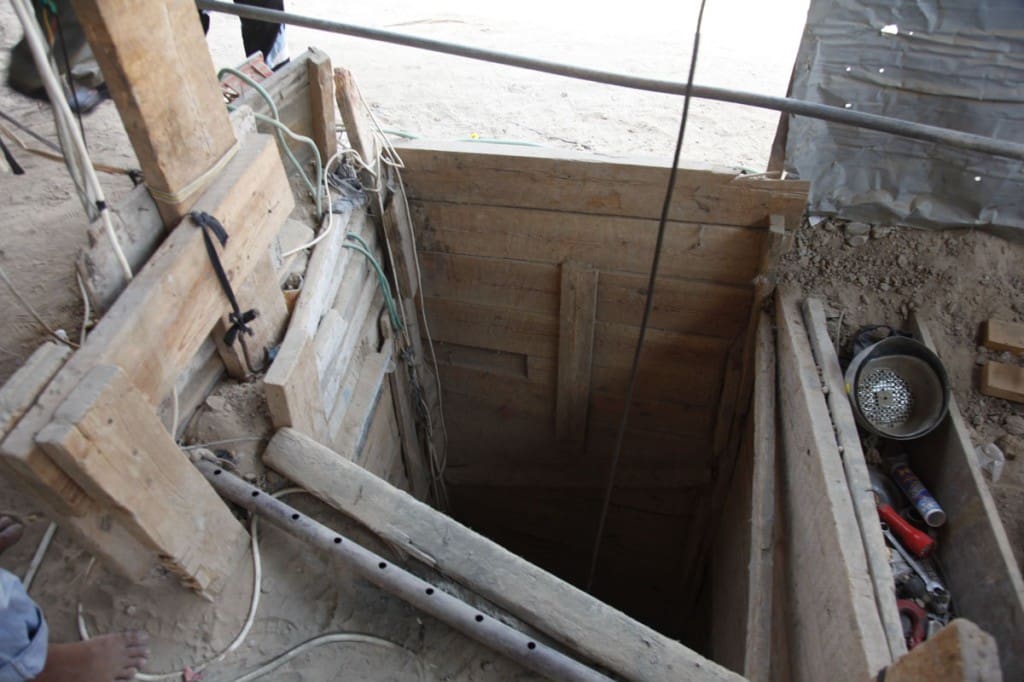
The “well”, or Al-Bir, at the end of the tunnel, is a big circular open shaft, about 40 meters deep, where natural light from the Gaza sky could be seen. Filling the complete diameter of this shaft is a wooden platform elevator operating by side pulleys, wide enough to transport people, cars, animals, animal-drawn carts, cement, gasoline, etc. As we arrived to Al-Bir, a maintenance crew of 4 young men was fixing the platform. The atmosphere was nonchalant and normal. I did not feel any sense of urgency, or that they were on some sort of a military mission; they were joking and laughing with each other and taking their time. Sometimes they were serious. But they appeared like a normal maintenance crew, taking their job seriously. Every now and then, they asked me questions about where I was from, and why did I come through the tunnel not the official crossing (al-Ma’bar), etc. When I said I am a Palestinian living now in Ramallah, one asked, “where in Ramallah do you live? I lived there until ‘Al-Khityar’ (Abu Ammar) died; I was in the presidential guard,” he made a point to tell me, and to indicate, perhaps, that he was (or is) Fateh? We waited in Al-Bir, 40 meters underground for about 20-30 minutes until the crew completed the maintenance chores. During this time, electricity went out and the entire tunnel was pitch-black for a few seconds until generators kicked in without delay.
Now the elevator-platform is ready for operation. I was ready and elated to be lifted up with my suitcase. Before I did, I handed the “tuk tuk” driver a few Shekels for his trouble. Once on top, my contacts/organizers were waiting with broad smiles that I made it safely. A policeman was sitting there on a plastic chair “checking” those coming in. A car drove us to Gaza City, and that was it.
Read Part Two of this account to be posted on June 6, 2012.

